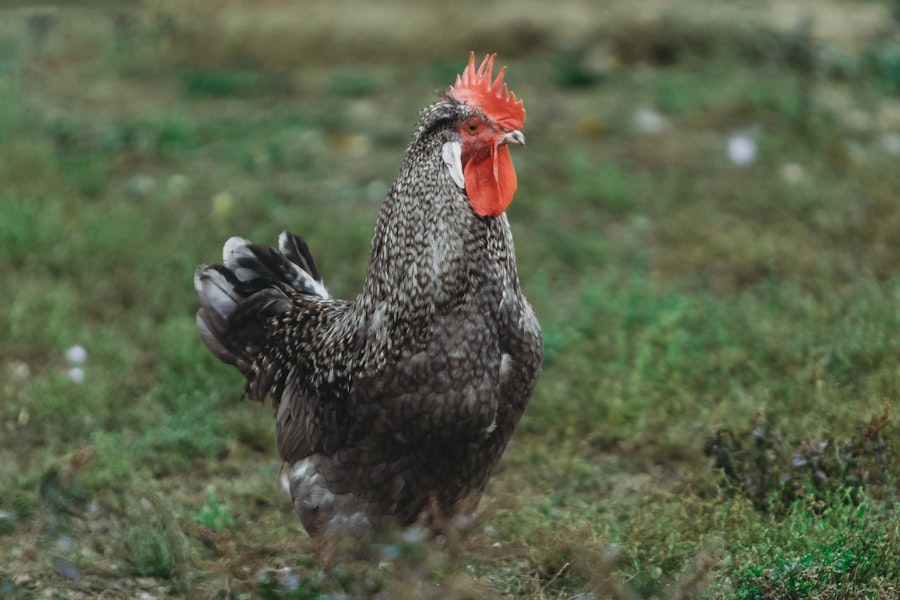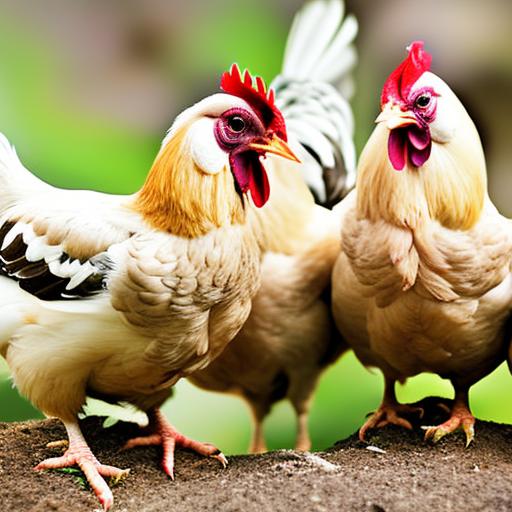Keeping chickens as a vegan is a topic that sparks much debate and discussion within the vegan community. On one hand, vegans strive to live a lifestyle that minimizes harm to animals, and keeping chickens for their eggs may seem contradictory to this principle. However, there are vegans who argue that keeping chickens can be ethical if done in a way that prioritizes the welfare of the animals. In this article, we will explore the ethical considerations of keeping chickens as a vegan, understand their nutritional needs and how to provide for them without animal products, discuss the benefits and challenges of raising chickens in a vegan household, and delve into the importance of rescuing chickens and giving them a safe home.
Key Takeaways
- Keeping chickens as a vegan requires ethical considerations and a commitment to their welfare.
- Providing a balanced diet for chickens without animal products is possible with proper research and planning.
- Chickens can provide a source of companionship, entertainment, and fresh produce for a vegan lifestyle.
- Raising chickens as a vegan can be challenging, but it is possible with dedication and education.
- Ensuring the welfare of chickens in a vegan household involves providing adequate space, food, and medical care.
- Rescuing chickens and giving them a safe home is a compassionate and sustainable choice for vegans.
- Chickens play an important role in sustainable living and permaculture by providing natural pest control and fertilizer.
- Legal considerations for keeping chickens in urban areas vary by location and should be researched before starting a backyard flock.
- Eggs are not necessary for a vegan diet, and there are many alternatives available.
- Backyard chicken-keeping can have a positive impact on the environment and local communities when done responsibly.
The ethical considerations of keeping chickens as a vegan
The ethical dilemma of keeping chickens as a vegan arises from the question of whether it is morally justifiable to use animals for our own benefit, even if we provide them with a good quality of life. Some vegans argue that keeping chickens for their eggs perpetuates the idea that animals are commodities to be used for our own gain. They believe that it is not our place to exploit animals, even if we treat them well.
On the other hand, there are vegans who believe that keeping chickens can be ethical if done in a way that prioritizes the welfare of the animals. They argue that by providing rescued or adopted chickens with a safe and comfortable home, we are giving them a chance at a better life. These vegans believe that it is possible to have a mutually beneficial relationship with animals, where both parties benefit from each other’s presence.
Personal opinions on this issue may vary among vegans. Some may choose not to keep chickens at all, while others may feel comfortable doing so as long as they prioritize the welfare of the animals and ensure they have a good quality of life.
Understanding the nutritional needs of chickens and how to provide them without animal products
Chickens have specific nutritional requirements that need to be met in order for them to thrive. They require a balanced diet that includes protein, carbohydrates, fats, vitamins, and minerals. Traditionally, chickens have been fed animal-based feeds that contain ingredients such as fish meal, bone meal, and blood meal. However, there are vegan-friendly alternatives available that can meet the nutritional needs of chickens.
One option is to feed chickens a commercially available vegan feed. These feeds are formulated to provide all the necessary nutrients without the use of animal products. They typically contain ingredients such as soybean meal, corn, wheat, and various vitamins and minerals. It is important to choose a feed that is specifically formulated for chickens, as their nutritional needs differ from other animals.
Another option is to create a homemade feed using plant-based ingredients. This can be more time-consuming and requires careful consideration of the nutritional content of each ingredient. Some common ingredients used in homemade chicken feed include grains such as corn, wheat, and oats; legumes such as soybeans and lentils; and various seeds and nuts.
In addition to providing a balanced diet, it is important to ensure that chickens have access to fresh water at all times. Water is essential for digestion, temperature regulation, and overall health.
The benefits of having chickens for a vegan lifestyle
Keeping chickens can offer several benefits for those following a vegan lifestyle. One of the main benefits is the joy and satisfaction that comes from caring for animals. Chickens are social creatures that can form bonds with their human caregivers. They can provide companionship and a sense of purpose.
Another benefit is the potential for fresh eggs. While some vegans choose not to consume eggs at all, others may be open to consuming eggs from their own backyard chickens. These eggs are often considered more ethical than those produced in factory farms, as the chickens are given a good quality of life and are not subjected to the same level of exploitation. However, it is important to note that not all vegans agree on the ethics of consuming eggs, even if they come from backyard chickens.
Chickens also produce manure, which can be used as a natural fertilizer for the garden. This can help reduce the need for synthetic fertilizers and promote sustainable gardening practices.
The challenges of raising chickens as a vegan
While there are benefits to raising chickens as a vegan, there are also challenges that come with it. One of the main challenges is the potential for health issues in chickens. Chickens can be susceptible to various diseases and parasites, and it is important to provide them with proper veterinary care. This may involve finding a veterinarian who is knowledgeable about chicken health and welfare.
Another challenge is ensuring that chickens receive all the necessary nutrients in their diet. As mentioned earlier, providing a balanced diet is crucial for their health and well-being. It may require some trial and error to find the right feed or combination of ingredients that meets their nutritional needs.
Additionally, chickens require a safe and secure living environment. They are vulnerable to predators such as foxes, raccoons, and birds of prey. It is important to provide them with a secure coop and run that protects them from these threats.
How to ensure the welfare of chickens in a vegan household

Ensuring the welfare of chickens in a vegan household is of utmost importance. Just like any other animal, chickens have specific needs that must be met in order for them to live happy and healthy lives.
One way to ensure their welfare is by providing them with a safe and comfortable living environment. This includes a secure coop and run that protects them from predators, as well as adequate space for them to move around and exhibit natural behaviors such as scratching and dust bathing. It is also important to provide them with clean bedding material, such as straw or wood shavings, and to regularly clean their living area to prevent the buildup of waste and bacteria.
Chickens also require mental stimulation and social interaction. They are social animals that thrive in the company of others. It is recommended to keep chickens in small groups or flocks to allow for socialization. Providing them with toys, perches, and access to outdoor areas where they can forage and explore can also help keep them mentally stimulated.
Regular health checks are essential for ensuring the welfare of chickens. This includes monitoring their overall health, checking for signs of illness or injury, and providing necessary veterinary care. It is important to find a veterinarian who is knowledgeable about chicken health and welfare and to establish a good relationship with them.
The importance of rescuing chickens and giving them a safe home
Rescuing chickens and giving them a safe home is an important aspect of animal welfare. Many chickens are bred for commercial purposes and live in cramped and stressful conditions in factory farms. By adopting or rescuing chickens, we can give them a chance at a better life.
There are several benefits to adopting rescued chickens. Firstly, it provides them with a safe and comfortable living environment where they can exhibit natural behaviors and live a more fulfilling life. Secondly, it helps reduce the demand for commercially bred chickens, which can contribute to the cycle of exploitation in the poultry industry. Lastly, it allows us to form a bond with these animals and experience the joy and satisfaction that comes from caring for them.
There are various resources available for finding and adopting rescued chickens. Local animal shelters or rescue organizations may have chickens available for adoption. Additionally, there are online platforms and forums where people can connect with others who are looking to rehome their chickens.
The role of chickens in sustainable living and permaculture
Chickens play an important role in sustainable living and permaculture practices. They can contribute to the overall health and productivity of a garden or farm by providing pest control and soil fertilization.
Chickens are natural foragers and can help control pests such as slugs, snails, and insects. They will happily eat these pests, reducing the need for chemical pesticides. Additionally, their scratching behavior helps to aerate the soil and break down organic matter, which can improve soil fertility.
Chickens also produce manure, which is a valuable source of nutrients for plants. Their manure can be composted and used as a natural fertilizer for the garden. This helps reduce the need for synthetic fertilizers, which can have negative environmental impacts.
Integrating chickens into a permaculture system involves careful planning and consideration. It is important to provide them with appropriate housing and access to outdoor areas where they can forage. It is also important to rotate their grazing areas to prevent overgrazing and ensure that they have access to fresh vegetation.
The legal considerations of keeping chickens in urban areas
Keeping chickens in urban areas may be subject to various legal considerations and regulations. It is important to familiarize yourself with the local laws and regulations before deciding to keep chickens.
Some cities or municipalities may have restrictions on the number of chickens allowed, the type of housing required, or the distance between coops and neighboring properties. There may also be regulations regarding noise, odor, and waste management.
To comply with local laws and regulations, it is important to do thorough research and obtain any necessary permits or licenses. It may also be helpful to reach out to local authorities or animal control agencies for guidance.
The potential for eggs in a vegan diet and alternatives to consuming them
The potential for eggs in a vegan diet is a topic of much debate within the vegan community. While some vegans choose not to consume eggs at all due to ethical concerns, others may be open to consuming eggs from their own backyard chickens.
For those who choose to consume eggs, it is important to ensure that the chickens are well cared for and have a good quality of life. This means providing them with a balanced diet, adequate living space, and access to outdoor areas where they can exhibit natural behaviors.
For those who do not consume eggs, there are several alternatives available. One option is to use commercial egg substitutes, which are made from plant-based ingredients such as tofu, chickpea flour, or flaxseed. These substitutes can be used in baking or cooking in place of eggs.
Another option is to use ingredients such as applesauce, mashed bananas, or chia seeds as egg replacements in recipes. These ingredients can help bind ingredients together and provide moisture, similar to eggs.
The impact of backyard chicken-keeping on the environment and local communities
Backyard chicken-keeping can have both positive and negative impacts on the environment and local communities. On one hand, chickens can contribute to sustainable living practices by providing pest control and natural fertilizer for gardens. They can also help reduce the demand for commercially bred chickens, which can have negative environmental impacts.
However, there are also potential drawbacks to backyard chicken-keeping. Chickens produce waste, which can contribute to odor and waste management issues if not properly managed. Additionally, chickens may create noise disturbances, especially if they are kept in close proximity to neighboring properties.
To minimize the negative impact and maximize the positive impact of backyard chicken-keeping, it is important to be mindful of waste management practices. Regularly cleaning the coop and run, composting manure, and using it as fertilizer can help reduce odor and waste buildup. It is also important to be considerate of neighbors and address any noise concerns that may arise.
Keeping chickens as a vegan is a complex topic that requires careful consideration of ethical considerations, nutritional needs, welfare concerns, legal considerations, and environmental impacts. While there are differing opinions within the vegan community, it is important to prioritize the welfare of the animals and ensure that they have a good quality of life. By providing rescued or adopted chickens with a safe and comfortable home, we can give them a chance at a better life and experience the joy and satisfaction that comes from caring for animals.
If you’re a vegan who is considering keeping chickens, you may be interested in learning more about the topic. One related article that you might find helpful is “Can Vegans Keep Chickens?” This article explores the ethical considerations and practical aspects of vegans raising chickens for eggs. It delves into topics such as providing a cruelty-free environment, alternative sources of eggs, and the importance of rescuing hens. For more information on this subject, you can check out the article here. Additionally, if you’re looking for tips on how to insulate a chicken coop to ensure your chickens’ comfort during colder months, you can find a useful guide here. Lastly, if you’re curious about when guinea fowl lay eggs and want to expand your knowledge on poultry breeding, this article here provides valuable insights.
FAQs
What is veganism?
Veganism is a lifestyle that involves avoiding the use of animal products for food, clothing, or any other purpose.
Can vegans keep chickens?
Yes, vegans can keep chickens as pets, but they should not use them for food or any other purpose that exploits them.
What are the reasons for vegans to keep chickens?
Vegans may keep chickens for companionship, to provide a safe and happy home for rescued birds, or to help educate others about the importance of animal welfare.
What are the ethical considerations for vegans keeping chickens?
Vegans who keep chickens should ensure that they provide a safe and comfortable environment for the birds, and that they do not exploit them for food, eggs, or any other purpose.
What are the challenges of keeping chickens as a vegan?
The challenges of keeping chickens as a vegan include ensuring that the birds receive proper care and nutrition, dealing with health issues, and finding a veterinarian who is knowledgeable about avian care.
What are some alternatives to keeping chickens for vegans?
Vegans who do not want to keep chickens can support animal sanctuaries that provide a safe and happy home for rescued birds, or they can volunteer at such sanctuaries to help care for the animals.
Meet Walter, the feathered-friend fanatic of Florida! Nestled in the sunshine state, Walter struts through life with his feathered companions, clucking his way to happiness. With a coop that’s fancier than a five-star hotel, he’s the Don Juan of the chicken world. When he’s not teaching his hens to do the cha-cha, you’ll find him in a heated debate with his prized rooster, Sir Clucks-a-Lot. Walter’s poultry passion is no yolk; he’s the sunny-side-up guy you never knew you needed in your flock of friends!







